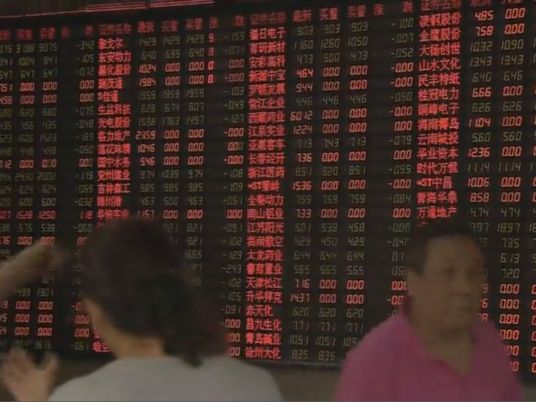
Global stock markets plunged further on Tuesday as more gloomy evidence emerged of China's economic slowdown, leading to heavy sell-offs in Asia and Europe.
Downbeat data showed factory activity in China hit a three-year low, fuelling concern over the health of the world's number two economy.
Tokyo stocks tumbled almost four percent as China woes spread, sending major European bourses sliding by around two percent in late morning deals.
China's statistics bureau said its Purchasing Managers' Index of manufacturing activity came in at 49.7 last month, its lowest since August 2012. A reading below the 50-point mark indicates contraction.
The key indexes are seen as barometers of the economic health of Asian giant, which has been a major engine of global growth.
– Starting September in red –
?Equity markets (are) starting the new month in the red after yet more disappointing China manufacturing data increases concerns about (the) slowing of the world's number two economy," said analyst Mike van Dulken at Accendo Markets.
Frankfurt, London and Paris were also pulled sharply lower on Tuesday by declining domestic manufacturing figures.
"Another set of disappointing Chinese manufacturing data has prompted (losses) for UK and European stocks on Tuesday with a slowdown in Europe?s own manufacturing sector exacerbating the declines," added CMC Markets analyst Jasper Lawler.
Global equities — hammered last week on worries that the flagging Chinese economy would spark a new global recession — also fell on Monday over the uncertain outlook for US interest rates.before a closely watched jobs report due on Friday.
A US Federal Reserve rate hike could further jolt global confidence, which has already been buffeted by China's slowdown.
"Investors are concerned about the strength of the global economy, which is why you're seeing a sell-off in various stock markets," said strategist Ayako Sera at Sumitomo Mitsui Trust Bank Ltd. in Tokyo.
The Shanghai stock market ended down 1.23 percent on Tuesday, having tumbled by more than four percent at one point — after the downbeat data.
Tokyo dived 3.84, with a stronger yen hitting exporters, while Sydney fell 2.12 percent and Hong Kong finished 2.24 percent lower.
"The manufacturing index still shows that the economy is in the process of seeking a bottom," said Wu Kan, a Shanghai-based fund manager at JK Life Insurance.
"The market is unlikely to pick up any time soon."
– Shift to safety –
China's stock markets have slumped 40 percent since hitting a June 12 peak, with investors concerned about high valuations and the underlying strength of the economy.
The seeming inability of Communist Party leaders to stem the crisis — five interest rate cuts since November have not staunched the sell-off — has raised wider fears about their ability to effectively manage China's transition from low- to middle-income economy.
In the latest bid to avert further losses, Beijing urged listed companies to merge and restructure.
Authorities will strongly encourage tie-ups to help push reform of state companies and inject vitality into the economy, a joint statement released by four government agencies said late Monday.
Volatility in China and other emerging markets has pushed up the price of investments considered safe, including the yen and bullion.
On Tuesday the dollar fell to 119.88 yen from 121.24 yen in New York trade late on Monday.
The European single currency advanced to $1.1276, up from $1.1213.
Oil prices meanwhile fell in Asia after recording gains of more than 25 percent over the previous three sessions.
The commodity had surged Monday after the US Department of Energy said domestic output in June was much lower than first stated, while monthly estimates for January-May were revised lower.
Also, a statement from OPEC — to the effect that the continuing downward pressure on prices "remains a cause for concern" — fanned hopes that the oil cartel could cut output levels.


